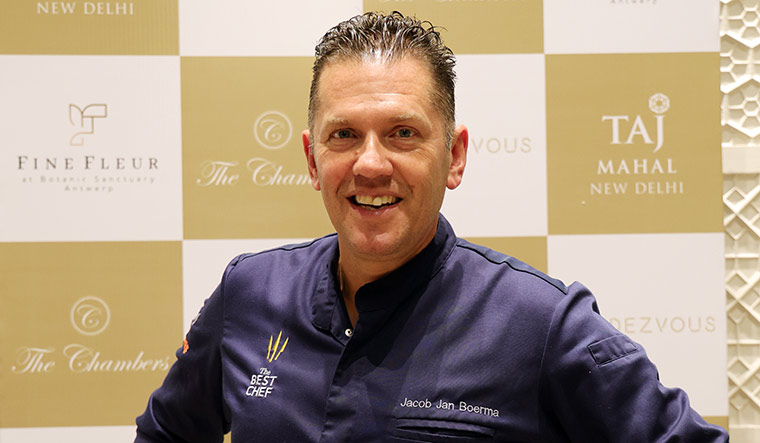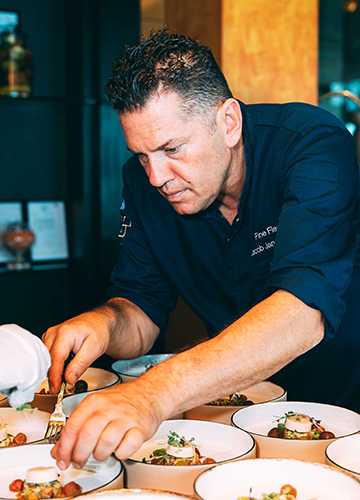Every successful person has a story to tell. For Dutch chef Jacob Jan Boerma (pronounced Yakub Yan Boerma)―whose restaurants have earned five Michelin Stars―it was licking dishes for flavours while working as a dishwasher in his early days. Growing up, his parents would take him to Michelin starred restaurants across Italy, Spain and France. This ignited a passion for food. When Boerma came across the French Michelin Guide in his family car as a child, he dreamt of owning a restaurant with three Michelin stars.
Boerma’s dream came true with his fine dining restaurant, De Leest, located in Vaassen in the Netherlands, which went on to earn three Michelin Stars. “Before starting my own business, I gained experience both domestically and internationally, working with leading chefs such as Dieter Müller, Roger Souvereyns, and Wulf Engel.” However, he gave it all up at the peak when he shut down the restaurant, in 2020, to spend more time with his then four-year-old son.
In an industry where even the chef’s role is viewed through a gendered lens―cooking professionally is largely considered a man’s job while cooking domestically is seen as a woman’s job―stepping back from a successful career redefines masculinity. It also tells a lot about his confidence in his art. “I was 14 and I had already been to a Michelin restaurant with my parents,” he says, “I started loving food. It wasn’t easy to dream of cooking and owning a three Michelin starred restaurant. But after gaining some experience, I opened my restaurant and ended up cooking there for almost 20 years.”
Boerma knows his art well. When he opened The White Room in Amsterdam and Fine Fleur in Antwerp―both earned Michelin Stars within months. Boerma delights his customers thrice with his intricately prepared dishes: first comes the visual beauty of his presentation, then the aroma, and, finally, the burst of flavours.
According to Boerma, the taste of a chef is his or her identity. Flavouring your personal touch and respecting the ingredients make you stand out, he says. “De Leest was my home and its kitchen was my living room. I was at work for 14-16 hours a day. I quit to spend time with my son and also to change my style of working,” he says. He ran the restaurant with his wife. They stepped down to raise their child together. In his new restaurants, Boerma has given a platform to younger chefs and has stepped aside from working extensive hours.
In India, to headline Culinary Chronicles―Rendezvous by The Chambers, a series of intimate and immersive culinary events at The Taj Mahal Palace, Mumbai and Taj Mahal, New Delhi, Boerma served his signature preparations―crispy shrimp, lamb loin miso, burnt sweet pepper, open ravioli of eggplant, Indian curry flan and more. With each course, the chef paired champagne, chardonnay, wine rose and red wine, respectively.
Boerma has a knack for blending global influences with locally sourced ingredients. In India, he worked with local chefs to recreate his popular dishes. “This is my first visit to India. I have already met so many talented chefs. Their stories and their love for cuisine is so inspiring. We are from different places but we share the same passion,” he says. He calls the experience one-of-a-kind as the Indian chefs working with him knew nothing about Dutch cuisine and he knew nothing about Indian cuisine.
 Lemon and Yuzu
Lemon and Yuzu
Boerma says India is rich in flavours and has a strong street food presence. He says he would love to bring more fine dining experiences to India. “There are no concrete talks yet, but who knows? I would love Indians to celebrate fine dining culture,” he says, while making a point for having a Michelin starred restaurant in India.
 Lamb Loin Miso
Lamb Loin Miso
Boerma is constantly travelling and preparing food across continents. Wherever he goes, he loves to experiment with the local ingredients. “My culinary philosophy revolves around enhancing nature with new ingredients, new flavours, or new discoveries that form the true foundation of my food philosophy,” he says, “The exceptional quality of local ingredients in India forms the base for creating successful dishes. The kitchen teams here have provided me with so many fresh options, and it is truly great to work with them.”
 Stuffed Zucchini Flower
Stuffed Zucchini Flower
Boerma often draws upon his global experiences, including his travels to Asia and Scandinavia, to create cosmopolitan and innovative dishes. “The chefs at The Taj Mahal Palace, Mumbai, have made me try different local dishes―they are filled with flavours and aroma,” he says, “At Taj Mahal, New Delhi, I am looking forward to dining at Varq for modern Indian food and tasting Indian wines and tapas at Captain’s Cellar―the new wine bar.”
What makes a restaurant qualify for Michelin Stars is the taste, says Boerma, “They must always respect the ingredients and ensure the flavours shine through clearly in each dish. As a guest, you should feel the chef’s passion on your plate, which forms the foundation of exceptional cuisine. Without a good foundation, there is no chance of achieving three stars.”
Boerma says the quality of the food is the foundation of success. “I am known for my great cooking skills and subtle combinations, as well as my elegant refinement, especially in light sauces and vinaigrettes,” he says.



